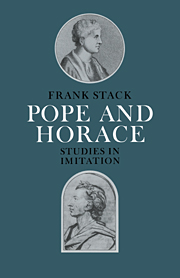Book contents
- Frontmatter
- Contents
- Acknowledgements
- List of abbreviations
- Preface
- PART I INTRODUCTIONS
- PART II THREE HORATIAN SATIRES (1733–4)
- PART III MATURE HORACE (1736–7)
- 6 Lyric vision: The Imitations of Odes IV.i. and IV.ix.
- 7 The Horatian epistle: The Imitation of Epistle II.ii.
- 8 Poetry and politics: The Imitation of Epistle II.i. (‘To Augustus’)
- PART IV THE TIME OF TENSION (1738)
- Epilogue
- Appendix: Imitations of Horace published 1730–40
- Notes
- Bibliography
- Index
6 - Lyric vision: The Imitations of Odes IV.i. and IV.ix.
Published online by Cambridge University Press: 08 January 2010
- Frontmatter
- Contents
- Acknowledgements
- List of abbreviations
- Preface
- PART I INTRODUCTIONS
- PART II THREE HORATIAN SATIRES (1733–4)
- PART III MATURE HORACE (1736–7)
- 6 Lyric vision: The Imitations of Odes IV.i. and IV.ix.
- 7 The Horatian epistle: The Imitation of Epistle II.ii.
- 8 Poetry and politics: The Imitation of Epistle II.i. (‘To Augustus’)
- PART IV THE TIME OF TENSION (1738)
- Epilogue
- Appendix: Imitations of Horace published 1730–40
- Notes
- Bibliography
- Index
Summary
All hail! once pleasing, once inspiring Shade,
Scene of my youthful Loves, and happier hours!
Where the kind Muses met me as I stray'd,
And gently pressd my hand, and said, Be Ours.
Take all thou e're shalt have, a constant Muse:
At Court thou may'st be lik'd, but nothing gain;
Stocks thou may'st buy & sell, but always lose;
And love the brightest eyes, but love in vain!
Pope to Teresa and Martha Blount, 13 September 1717In 1737, two years after Sober Advice, Pope published as a group three new Imitations of Horace. In March he brought out an Imitation of Horace's Ode IV.i., ‘To Venus’, in April an Imitation of Epistle II.ii., and in May an Imitation of Epistle II.i. These poems mark a whole new phase of Pope's relationship with Horace. There is a new seriousness in Pope's choice of Horatian models here, and a new depth in the Imitations themselves. After producing Imitations based on three early Horatian satires, he now presented Imitations modelled on Horace's very late poetry: the lyric which introduces Horace's last book of odes, and the two major works which together constitute Horace's last book of epistles.
We can account for this change partly in terms of the context in which the poems were written. It would seem that the period between 1736 and early 1737 was for Pope a time of contemplation and inward review. Between 1733 and 1735 Pope had published nine major poems, starting with the Epistle to Bathurst and ending with Of the Characters of Women and the second volume of his collected Works.
- Type
- Chapter
- Information
- Pope and HoraceStudies in Imitation, pp. 99 - 115Publisher: Cambridge University PressPrint publication year: 1985

